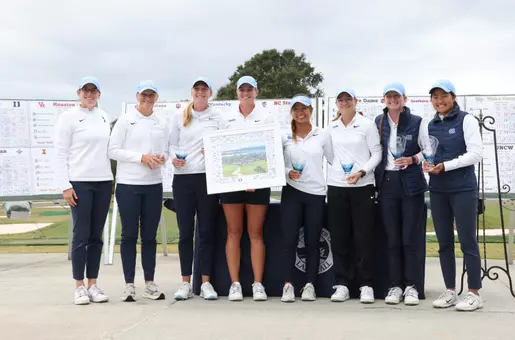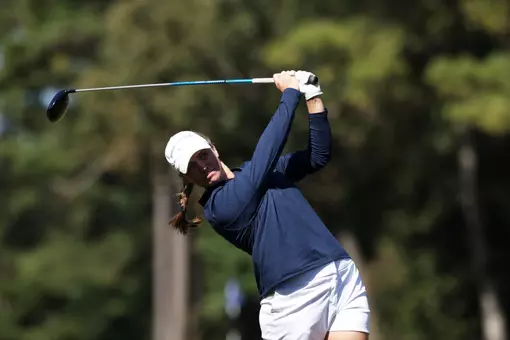University of North Carolina Athletics
Sharma Honored At UNC Children's Pinwheels & Promises Luncheon
March 5, 2018 | Women's Golf
By Pat James, GoHeels.com
When the email arrived in Keela Lyon's inbox in the fall of 2016, she didn't know what to expect.
The message had been sent to Lyon, the interim executive director of development at N.C. Children's Hospital, from a member of the UNC Food Allergy Initiative (UNCFAI). In it, they referenced how someone had contacted them about making a donation to the UNCFAI.
Rarely does anyone take such action, said David Wescott, the director of marketing and communications at N.C. Children's Hospital. Instead, the development team typically reaches out to potential donors. But Roshnee Sharma wasn't like most donors.
Lyon emailed Sharma, currently a sophomore on the North Carolina women's golf team, still unsure how much money Sharma wished to donate.
"I'm still thinking maybe a couple hundred bucks, which is great," Lyon said. "And then here she rolls up to the hospital with a $20,000 check. That was a bit mind-blowing for us."
That money, which Sharma raised through her nonprofit American Research Foundation for Nut Allergies (ARFNA), helped fund a pilot study that examined the efficacy and safety of a DNA-based vaccine to treat peanut and walnut allergies. The study produced promising data. And from those results, the project received a grant from the National Institute of Health (NIH).
Because of her contributions, the N.C. Children's Hospital featured Sharma as one of its speakers at Thursday's Pinwheels and Promises luncheon in Charlotte, Sharma's hometown.
"This is potentially a really big thing," said Wescott of the study, which is being conducted by Dr. Mike Kulis, a research assistant professor in the department of pediatrics at the UNC School of Medicine.
"We don't have enough data yet and we still have a long way to go. But these are the sorts of things that make discoveries possible. The initiative she took, the creativity she demonstrated, her generosity of spirit, I'd say there are few people like her."
According to Food Allergy Research and Education, a national nonprofit, researchers estimate that up to 15 million Americans have food allergies. Of that, 5.9 million are under the age of 18. Many have some sort of nut allergy.
Sharma was 2 when she was diagnosed with a severe peanut and nut allergy. Growing up, she couldn't visit friends' houses because of the risk of exposure. Even at UNC, members of the women's golf team have to be conscious about keeping nuts out of the locker room and not bringing any onto the course when playing with her.
Her allergies are a hindrance, she said. But she's never allowed them to define her. And with no definitive treatment or cure for her condition, she decided to play a part in attempting to discover a cure.
"I don't want to ever have people look around and be like, 'You can't eat this,'" Sharma said. "That's always an awkward conversation to have. So I just really wanted to find a cure, especially knowing that allergies are growing and really shouldn't be.
"I was looking at what was already out there, and there's really nothing out there for purely fundraising to find a cure. It's all about awareness. Awareness is great, but that's a band-aid; it's not the long run."
So in December 2014, she founded ARFNA.
The organization also raises awareness for peanut and nut allergies, but its main goal is to financially support research centers and organizations that are focused on improving the lives of allergy-suffering people. Sharma started collecting donations by going door to door in her neighborhood. She eventually began contacting potential high-status donors.
All the while, she was researching where she could allocate the donations. Enrolling at UNC presented numerous opportunities.
"When I came to UNC," Sharma said, "I was like, 'What better place than to just look here? I'll be on campus, I can go check it out whenever I want. It will be cool.'"
That led her to email the UNCFAI and later meet with Lyon. During their meeting, Lyon told Sharma about Kulis' study, which Sharma said was in danger of being shut down at the time because of a lack of funding.
Lyon ultimately introduced Sharma to Kulis, who told her more about his idea for a vaccine. That's all Sharma needed to hear.
"She was all on board," Lyon said. "She completely funded the first round of trials for him."
In Kulis' preliminary tests on mice, Sharma said the vaccination cured them of peanut and nut allergies. The data helped procure a $150,000 Small Business Innovative Research (SBIR) grant from the NIH that will continue funding the project and hopefully lead to a clinical study.
Even after making her donation, Sharma has stayed involved. She regularly meets with Kulis, Lyon and other members of the N.C. Children's Hospital.
"It shows she has a real commitment to make a difference and initiate change," Lyon said. "I love that in her, that she's not just following the course everyone else may follow. She really gets involved in the things she's passionate about and it shows in her passion."
On a few occasions, attending those meetings has caused Sharma to miss golf practice. But she said her coach, Jan Mann, has supported her and always tries to keep the rest of the team informed about her work.
"She's a very intelligent young lady, and this has been a life-changing experience for her to have gone through such a severe peanut allergy herself," Mann said. "And to want to try to make a difference for other kids, I think, is pretty special."
In addition to golf and visiting the N.C. Children's Hospital, Sharma balances her academics. She majors in computer science and business administration at the UNC Kenan-Flagler Business School, with hopes of starting a software company after graduation.
But she said she doesn't want to just be a programmer. She enjoys business and meeting new people, as evidenced through her work with ARFNA.
"I've definitely become a more confident person just in terms of reaching out to people," Sharma said. "It's never easy to ask for money. And I've learned a lot about marketing in general – making sure you follow up with the people who donated and what to do to make a problem seem real to them, because most of the time it doesn't directly impact them at all."
Sharma's speech at the Pinwheels and Promises luncheon provided her another opportunity to talk about the importance of supporting research at the N.C. Children's Hospital. But she's not stopping there.
"This fight isn't over for her, it's not over for the folks at the Food Allergy Initiative and it's not over for people like my son, who has a nut allergy," Wescott said. "She's not going to stop until the fight is done, that's for sure. She wants to see this thing through."









